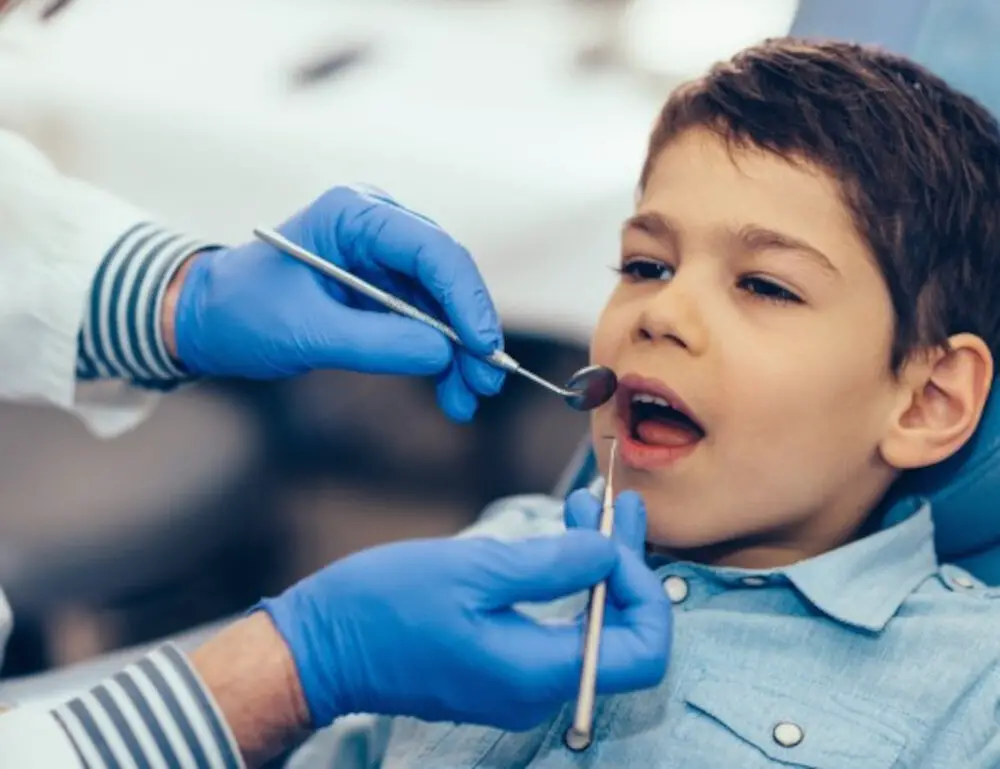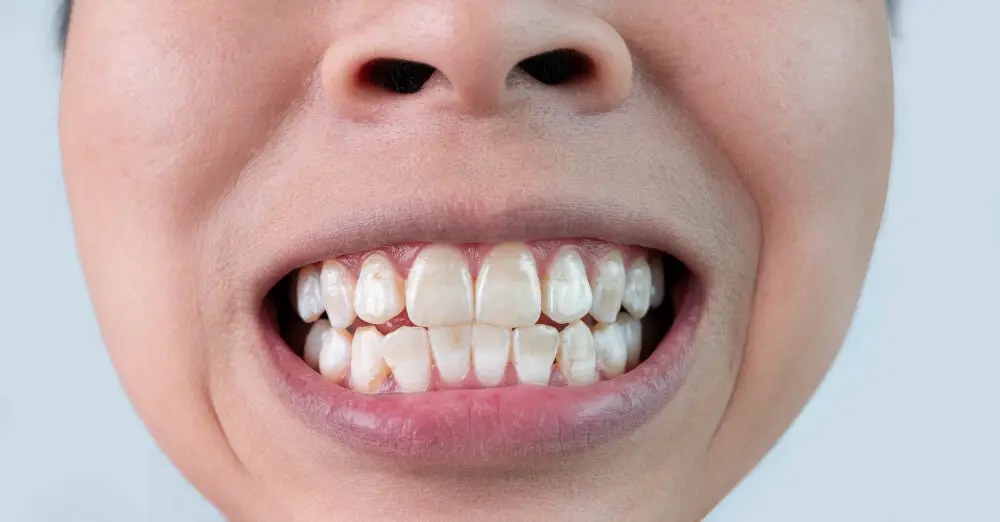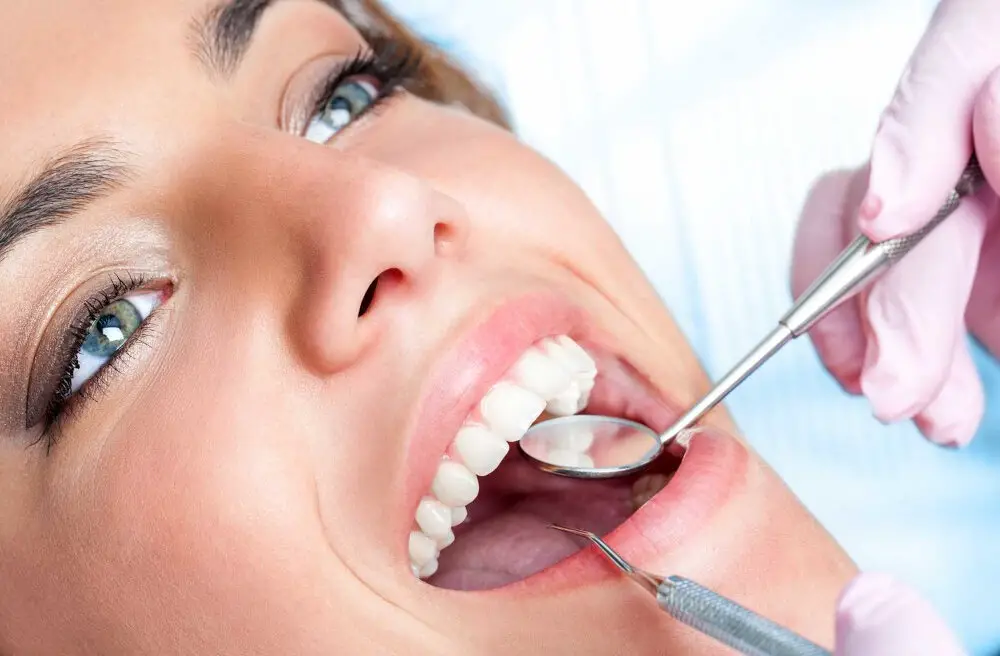Understanding the Cause: Why Your Teeth Bleed When Brushing and How to Prevent It

Bleeding gums can be a common occurrence when brushing your teeth, but it’s not something to ignore. It’s a sign that your gums are inflamed, which could lead to more serious dental issues if left untreated. Understanding the cause of bleeding gums and how to prevent it can help you maintain good oral health. There are several reasons why your gums may bleed when brushing your teeth. One of the main culprits is poor oral hygiene. When you don’t brush and floss regularly, plaque builds up on your teeth and gums, leading to inflammation and bleeding. Other factors that can contribute to bleeding gums include gum disease, hormonal changes, certain medications, and even brushing too hard. Regardless of the cause, taking steps to prevent bleeding gums is essential for maintaining a healthy smile.
Dental health is crucial for overall well-being and quality of life. Poor dental hygiene can lead to a variety of oral health issues such as tooth decay, gum disease, bad breath, and even tooth loss. These conditions can be uncomfortable, painful and can have a significant impact on daily activities such as eating, speaking, and self-esteem. Additionally, poor oral health is linked to a variety of systemic health issues such as heart disease, diabetes, and respiratory infections. Therefore, it is important to maintain good oral hygiene practices such as regular brushing and flossing, routine dental check-ups, and a balanced diet to prevent these issues and maintain optimal dental health.
Bleeding while brushing is a common dental problem that many people experience. It is often caused by gum inflammation, also known as gingivitis, which can be a result of poor oral hygiene, brushing too hard, or using a toothbrush with hard bristles. Other factors that can contribute to bleeding gums include hormonal changes, certain medications, and systemic diseases such as diabetes. It is important to address bleeding gums promptly to prevent further damage and potential tooth loss. Practicing good oral hygiene, using a soft bristled toothbrush, and regularly visiting your dentist can help prevent bleeding gums and ensure optimal oral health.
The purpose of this article is to shed light on the common problem of bleeding teeth during brushing and provide an understanding of the underlying causes and prevention measures. It is a fact that many people experience bleeding teeth while brushing, which can be concerning and uncomfortable. This article aims to educate readers on the various reasons why teeth may bleed, including gum disease, aggressive brushing, and certain medications. Additionally, it provides practical tips on how to prevent bleeding teeth, such as using a soft-bristled brush, flossing regularly, and visiting the dentist for regular check-ups and cleanings. Overall, the goal of this article is to help readers take better care of their dental health and prevent dental problems.
Causes of Bleeding While Brushing

Bleeding while brushing is a common dental problem that many people experience. The most common cause of bleeding while brushing is inflammation of the gums, also known as gingivitis. Gingivitis is caused by the buildup of plaque on the teeth and gums, which can lead to red, swollen, and bleeding gums. Poor oral hygiene, such as not brushing or flossing regularly, is often the main culprit of gingivitis. Other factors that can contribute to gingivitis include smoking, hormonal changes, certain medications, and genetics. If left untreated, gingivitis can progress to periodontitis, a more serious form of gum disease that can lead to tooth loss and other health problems. Another common cause of bleeding while brushing is using a toothbrush with bristles that are too hard or brushing too vigorously. Overbrushing can cause damage to the gums, leading to bleeding and gum recession. It is important to use a soft-bristled toothbrush and to brush gently in a circular motion to avoid causing damage to the gums. Using a mouthwash or rinse that contains alcohol can also contribute to bleeding gums, as the alcohol can dry out the mouth, leading to irritation and bleeding. If you experience bleeding while brushing, it is important to see a dentist to determine the cause and receive appropriate treatment. Maintaining good oral hygiene habits, such as brushing twice a day, flossing, and using mouthwash, can help prevent bleeding gums and other dental problems.
Gum disease, also known as periodontal disease, is a common dental problem that affects millions of people worldwide. It is caused by bacteria that accumulate on the teeth and gums, leading to inflammation, bleeding, and ultimately, tooth loss. Gingivitis is the earliest stage of gum disease, characterized by red, swollen, and bleeding gums. If left untreated, it can progress to periodontitis, a more severe form of gum disease that can cause the gums to recede, the teeth to become loose, and even bone loss. Fortunately, gum disease is preventable with proper oral hygiene, including regular brushing, flossing, and dental check-ups.
Brushing your teeth is an essential part of maintaining good oral hygiene, but if you brush too hard or use a hard-bristled toothbrush, it can lead to bleeding gums. When brushing too hard, you can damage the gum tissue, causing it to recede and exposing the sensitive roots of your teeth. This can also lead to tooth sensitivity and even tooth loss. Using a hard-bristled toothbrush can also contribute to bleeding gums because the bristles can be too abrasive and damage the gum tissue. To prevent bleeding gums, use a soft-bristled toothbrush and brush gently in circular motions, focusing on each tooth and the gum line. Remember, brushing your teeth should be a gentle and thorough process, not an aggressive one.
Vitamin deficiencies can play a major role in causing bleeding gums when brushing your teeth. Vitamins C and K are essential for maintaining healthy gums. A lack of vitamin C can weaken the blood vessels in your gums, causing them to bleed easily. Vitamin K helps with blood clotting, which can prevent bleeding gums. In addition, a deficiency in vitamin D can also lead to gum disease, which can cause bleeding. Therefore, it is important to ensure that you are getting enough vitamins in your diet to maintain healthy gums and prevent bleeding when brushing your teeth. Consult with your healthcare provider to determine if you need to supplement your diet with vitamins.
Blood clotting disorders refer to a range of conditions that affect the body’s ability to form clots in response to an injury or cut. These disorders can be caused by a variety of factors, including genetic mutations, medications, and underlying medical conditions, such as liver disease or cancer. When blood clotting disorders are present, the blood may not clot properly, leading to excessive bleeding and bruising. This can be a concern when it comes to brushing your teeth, as the friction of the bristles against your gums can cause bleeding if your blood is not clotting properly. If you suspect you may have a blood clotting disorder, it is important to speak with your doctor and get a proper diagnosis and treatment plan to manage your symptoms and prevent complications.
While medications can provide relief from various health conditions, they often come with side effects. Certain medications can cause bleeding gums, dry mouth, and other oral health problems. For example, blood thinners can increase the likelihood of bleeding while brushing teeth. Antidepressants and medications for high blood pressure can cause dry mouth, which can lead to tooth decay and gum disease. It’s important to inform your dentist of any medications you are taking so they can recommend appropriate preventive measures to maintain good oral health. Additionally, practicing good oral hygiene, such as brushing twice a day and flossing daily, can help prevent oral health problems caused by medications.
Prevention and Treatment

Prevention and treatment are crucial when it comes to addressing the issue of bleeding gums during brushing. The first step in preventing bleeding gums is to establish a healthy oral care routine. Brushing your teeth twice a day with a soft-bristled toothbrush and fluoride toothpaste can help remove plaque and tartar build-up that can cause gum irritation. Additionally, flossing daily and using mouthwash can also be beneficial in preventing gum disease. It is also important to visit a dentist regularly for check-ups and professional cleanings to maintain optimal oral health. If bleeding gums persist despite adopting a good oral care routine, it may be time to seek treatment. A dentist will be able to diagnose the underlying cause of the bleeding gums and provide the appropriate treatment. Depending on the severity of the condition, treatment may include scaling and root planing, which involves removing tartar and bacteria from the tooth surface and root, or gum surgery to repair damaged tissue. In cases where bleeding gums are caused by an underlying systemic condition, such as diabetes or anemia, it is important to manage the underlying condition as well. With proper prevention and treatment, bleeding gums can be addressed and optimal oral health can be maintained.
Proper brushing technique is essential to maintain good oral hygiene and prevent bleeding gums. Firstly, choose a toothbrush with soft bristles that won’t damage your gums. Then, hold the brush at a 45-degree angle to your teeth and use gentle circular motions to clean the front, back, and chewing surfaces of each tooth. Be sure to brush your gums as well, as this helps to remove any bacteria or plaque that may be present. Additionally, it’s important to brush for at least two minutes twice a day, and to replace your toothbrush every three to four months. By following these simple steps, you can keep your teeth and gums healthy and avoid the discomfort and embarrassment of bleeding gums while brushing.
Choosing the right toothbrush is crucial to maintaining good oral hygiene and preventing bleeding gums when brushing. When selecting a toothbrush, it’s important to consider the bristle type, size, and texture. Soft-bristled toothbrushes are highly recommended, as they’re gentle on the gum tissue and effectively remove plaque and bacteria. Additionally, smaller toothbrush heads allow for better maneuverability and access to hard-to-reach areas of the mouth. It’s also important to replace your toothbrush every three to four months or as soon as the bristles become frayed. By selecting the right toothbrush and replacing it regularly, you can help prevent bleeding gums and maintain optimal oral health.
Flossing and using mouthwash are two essential steps in maintaining good oral hygiene. Flossing helps remove food particles and plaque that can get stuck in between teeth, which can lead to bleeding gums and gum disease. It is important to floss gently, using a back and forth motion, to avoid damaging the gums. Mouthwash is also an effective way to reduce plaque and kill bacteria in the mouth. Look for a mouthwash that contains fluoride, which can help prevent tooth decay. However, it is important to remember that flossing and using mouthwash should not replace brushing your teeth twice a day with a fluoride toothpaste. By incorporating flossing and using mouthwash into your daily oral hygiene routine, you can help prevent bleeding gums and maintain a healthy smile.
Eating a balanced diet that is rich in vitamins and minerals is essential for maintaining healthy teeth and gums. Foods such as leafy greens, fruits, and vegetables are great sources of vitamins and minerals that promote healthy teeth and gums. However, sometimes it can be difficult to consume all the necessary nutrients through food alone, and that’s where vitamin supplements come in. Taking vitamin supplements can help fill in any nutritional gaps and ensure that your body is getting the necessary nutrients to maintain healthy teeth and gums. It’s important to speak with your healthcare provider before starting any vitamin supplement regimen to ensure that it’s safe and appropriate for you. Remember, a healthy diet and proper vitamin intake can go a long way in preventing bleeding gums when brushing.
It is essential to see a dentist regularly to maintain good oral health and prevent bleeding gums. Dentists can identify the root cause of the bleeding and provide appropriate treatment options. They can also provide tips on proper brushing and flossing techniques to prevent future bleeding. Neglecting regular dental checkups can lead to the development of gum disease, which can cause bleeding and other complications. By scheduling regular dental visits, individuals can ensure that their teeth and gums remain healthy and prevent any potential issues from escalating into more severe problems.
Gum disease is a common dental problem that can cause bleeding, swelling, and discomfort in the gums. The treatment options for gum disease depend on the severity of the condition. In the early stages, the dentist may recommend a professional cleaning and improved oral hygiene practices at home, such as brushing twice a day, flossing daily, and using an antiseptic mouthwash. For more advanced cases, the dentist may suggest scaling and root planing, a deep cleaning procedure that removes plaque and tartar from the roots of the teeth. In severe cases, surgery may be necessary to repair damaged tissue and prevent further damage to the gums and teeth. It is important to seek treatment for gum disease as soon as possible to prevent further complications and maintain good oral health.
When to See a Dentist

It is essential to see a dentist if you experience bleeding while brushing your teeth. Bleeding gums are a sign of gum disease, and if left untreated, it can lead to serious complications. Your dentist will examine your teeth and gums, and determine the underlying cause of the bleeding. This will enable them to recommend the appropriate treatment plan for you. Additionally, regular dental checkups are crucial in preventing gum disease and other oral health issues. Your dentist will clean your teeth, removing any plaque or tartar buildup that can cause bleeding gums. They will also offer advice on the best oral hygiene practices to maintain healthy teeth and gums. If you have bleeding gums, it is crucial to seek dental care immediately. Delaying treatment can lead to serious health problems, including tooth loss, gum recession, and bone loss. In addition to regular dental checkups, it is also essential to maintain good oral hygiene practices. Brush your teeth twice daily using fluoride toothpaste, floss at least once a day, and use mouthwash to kill bacteria that cause gum disease. A healthy diet rich in calcium, phosphorus, and vitamin D also plays a significant role in maintaining strong teeth and gums. By working closely with your dentist and following their recommendations, you can prevent bleeding gums and maintain good oral health.
One of the most common concerns that people have about their oral health is bleeding when brushing their teeth. While it is true that bleeding gums can be caused by a variety of factors, including poor oral hygiene, it is also possible for bleeding to persist despite diligent brushing and flossing. In these cases, it is important to seek the advice of a dental professional, as persistent bleeding can be a sign of a more serious underlying issue. Some possible causes of persistent bleeding include gum disease, medication side effects, or a vitamin deficiency. By identifying and addressing the root cause of the bleeding, individuals can take steps to prevent further damage to their teeth and gums and maintain optimal oral health.
Severe pain or discomfort while brushing or flossing is a common symptom of gum disease, also known as periodontal disease. When plaque builds up along the gum line, it can cause inflammation and infection. This, in turn, can lead to bleeding gums, sensitive teeth, and pain during brushing or flossing. Other factors that can contribute to gum disease include poor oral hygiene, smoking, stress, hormonal changes, and certain medications. To prevent gum disease and alleviate discomfort while brushing, it is important to maintain good oral hygiene habits, such as brushing twice a day, flossing daily, and visiting the dentist regularly.
Swollen or red gums can be a sign of gum disease, which is caused by the buildup of plaque on the teeth. Plaque contains bacteria that produce toxins, which can irritate the gums and cause them to become inflamed. This inflammation can lead to bleeding when brushing or flossing. Other factors that can contribute to swollen or red gums include hormonal changes, certain medications, and smoking. To prevent gum disease and reduce the risk of bleeding gums, it is important to maintain a good oral hygiene routine, including brushing twice a day, flossing daily, and visiting the dentist regularly for checkups and cleanings.
Loose or shifting teeth are a common dental problem that can be caused by a variety of factors. Gum disease, injury, and bruxism (teeth grinding) are some of the main culprits that can lead to loose teeth. Gum disease, in particular, can cause the gums to pull away from the teeth, which can result in the teeth becoming loose. Injury, such as a blow to the face, can also cause teeth to become loose or even fall out. Bruxism, on the other hand, can cause the teeth to shift over time due to the constant pressure put on them. If you are experiencing loose or shifting teeth, it is important to see a dentist as soon as possible to determine the underlying cause and take appropriate action to prevent further damage.
Bad breath or halitosis is a common oral health problem. It can be caused by various factors such as poor oral hygiene, gum disease, dry mouth, and certain foods. When bacteria build up in the mouth, it can lead to an unpleasant odor. Similarly, a bad taste in your mouth can also be a sign of poor oral health. This can be caused by the same factors that cause bad breath. It is important to maintain good oral hygiene to prevent bad breath and a bad taste in your mouth. This includes brushing your teeth twice a day, flossing daily, using mouthwash, and visiting the dentist regularly.
Other Factors to Consider

Aside from the common causes of bleeding gums when brushing, there are other factors that can contribute to this problem. One of these is hormonal changes, particularly during pregnancy. Hormonal changes can cause the gums to become more sensitive and prone to bleeding. It is important for pregnant women to maintain good oral hygiene and seek regular dental checkups to prevent potential complications. Another factor to consider is medication. Certain medications, such as blood thinners, can increase the risk of bleeding gums. It is important to inform your dentist of any medications you are taking before undergoing any dental procedures. Your dentist may adjust your treatment plan or recommend alternative medications to minimize the risk of bleeding gums. Additionally, smoking can also increase the likelihood of bleeding gums. Smoking can weaken the immune system and reduce blood flow to the gums, making them more susceptible to bleeding. Quitting smoking can significantly improve gum health and reduce the risk of bleeding gums.
Smoking and tobacco use are one of the leading causes of gum disease, which can cause bleeding when brushing. Tobacco products contain harmful chemicals that can damage the gums and teeth, leading to inflammation and infection. Smoking can also reduce blood flow to the gums, making it harder for the body to fight off infection and heal properly. Furthermore, tobacco use can stain teeth and cause bad breath, making it an overall detrimental habit for oral health. Quitting smoking and tobacco use is essential for maintaining healthy teeth and gums, and preventing bleeding during brushing.
Diabetes is a chronic metabolic disorder characterized by high blood sugar levels resulting from the body’s inability to produce or properly use insulin. This condition can increase the risk of several health complications, including cardiovascular disease, nerve damage, and kidney disease. Moreover, diabetes can also affect oral health and contribute to bleeding gums, periodontal disease, and tooth loss. Poor blood sugar control can weaken the immune system, making it difficult for the body to fight off infections, including those in the mouth. Therefore, people with diabetes should prioritize their dental health by maintaining good oral hygiene habits, monitoring their blood sugar levels, and attending regular dental checkups.
Although pregnancy is a beautiful and life-changing experience for women, it can also come with some unpleasant side effects, such as bleeding gums. This is due to hormonal changes that increase blood flow to the gums, making them more sensitive and prone to inflammation. Additionally, the body’s immune system may weaken during pregnancy, making it easier for bacteria to build up and cause gum disease. To prevent bleeding gums during pregnancy, it is essential to maintain good oral hygiene by brushing twice a day, flossing daily, and visiting the dentist regularly. A balanced diet rich in vitamins and minerals can also help keep gums healthy.
Stress and anxiety can also be contributing factors to bleeding gums when brushing your teeth. When the body is under stress, it releases hormones that can lead to inflammation and weakened immune system, making it easier for bacteria to grow in the mouth. Additionally, stress can lead to grinding or clenching of the teeth, which can cause damage to the gums and teeth. Managing stress through practices such as exercise, meditation, and therapy can help reduce the risk of bleeding gums and improve overall oral health.
Bleeding while brushing is a common dental issue that is caused by various factors. One of the primary factors is poor oral hygiene, which leads to the accumulation of plaque and bacteria on the teeth and gums. Other causes include aggressive brushing, gum disease, hormonal changes, vitamin deficiencies, and certain medications. To prevent bleeding while brushing, it is crucial to maintain good oral hygiene practices, such as brushing twice a day with a soft-bristled toothbrush and fluoride toothpaste, flossing daily, and using an antibacterial mouthwash. It is also recommended to visit the dentist regularly for check-ups and cleanings. Additionally, choosing a toothbrush with soft bristles and brushing gently can help prevent further damage to the gums. By taking these preventative measures, individuals can decrease their risk of experiencing bleeding while brushing and maintain good oral health.
It is crucial to seek professional help when experiencing recurring bleeding while brushing your teeth. This could be a sign of an underlying dental issue that needs to be addressed. A dentist or dental hygienist can examine your teeth and gums and determine the cause of the bleeding. They can also provide you with personalized advice on how to prevent it from recurring. Ignoring the problem or trying to self-diagnose can lead to further complications and potentially irreversible damage to your oral health. Seeking professional help can ensure early detection and timely treatment, ultimately preserving the health of your teeth and gums.
Prioritizing dental health is crucial for maintaining overall health and well-being. Bleeding gums during brushing can indicate the presence of gum disease, which can lead to tooth loss and other serious health issues. To prevent this, it’s important to establish a regular oral hygiene routine that includes brushing twice a day, flossing, and using mouthwash. Additionally, maintaining a healthy diet and avoiding tobacco products can also contribute to the health of your teeth and gums. By prioritizing dental health, you can prevent bleeding gums and ensure that your teeth and gums are healthy and strong for years to come.
Conclusion

In conclusion, understanding the cause of why your teeth bleed when brushing is crucial for maintaining good oral health. It could be a result of improper brushing techniques, gum disease, or other underlying health conditions. However, with proper dental care and regular visits to the dentist, you can prevent bleeding gums and maintain healthy teeth and gums. It is important to brush gently and use a soft-bristled brush, floss regularly, and incorporate a mouthwash into your daily routine. By taking these simple steps, you can keep your teeth and gums healthy and prevent bleeding when brushing. Remember, a healthy mouth is a key component of overall wellbeing, so make sure to prioritize your oral hygiene.







